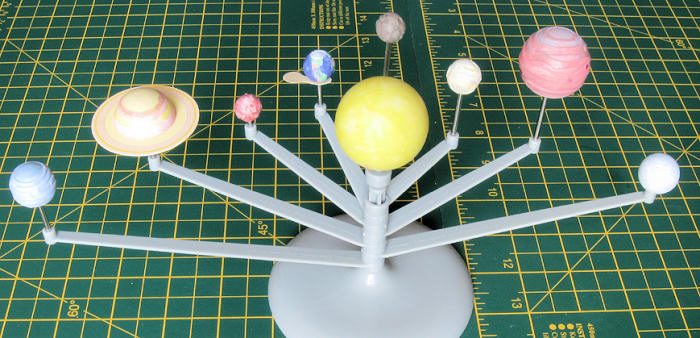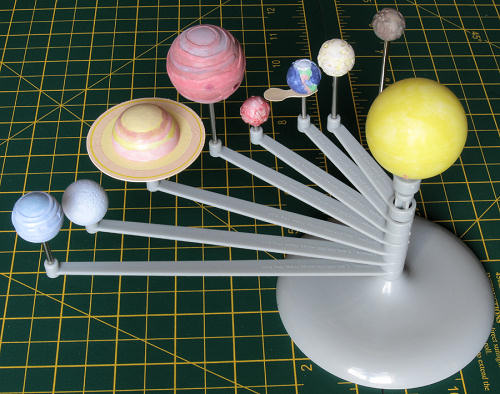
4M Solar
System Model, not to scale
| KIT #: | 03257 |
| PRICE: |
£12.94
including postage |
| DECALS: | none |
| REVIEWER: | Jeff Simpson |
| NOTES: | Provided glow in the dark paint not used. |

| HISTORY |
There are a lot of good websites on astronomy, the solar system and orrerys.
| THE KIT |
 In
my excitement I forgot to photograph the sprues before they had been assembled
and painted, however the back of the box gives a good idea of what is included
in the kit. In addition to a set of acrylic colours a sachet of “glow in the
dark paint” is provided, the sachet glows when moved out of the light into a
dark place.
In
my excitement I forgot to photograph the sprues before they had been assembled
and painted, however the back of the box gives a good idea of what is included
in the kit. In addition to a set of acrylic colours a sachet of “glow in the
dark paint” is provided, the sachet glows when moved out of the light into a
dark place.
4M make a wide range of educational toy/kits easily found in hobby shops, science museum shops and online. This one is suitable for ages 8 and over.
| CONSTRUCTION |
 The planet
sizes are not proportionate to the real things, nor do the “surface details”
bear much relation to the real thing, except in the case of Earth where the
landmasses are faithfully reproduced. Before detaching the parts from the sprues
I made a note of the diameters of the planets. In this way after snapping the
planet halves together I was able to check which was supposed to be which. They
do snap very tight, so it is a good idea to put the pre-coloured Saturn’s ring
in position before snapping the halves together, no need to test fit.
The planet
sizes are not proportionate to the real things, nor do the “surface details”
bear much relation to the real thing, except in the case of Earth where the
landmasses are faithfully reproduced. Before detaching the parts from the sprues
I made a note of the diameters of the planets. In this way after snapping the
planet halves together I was able to check which was supposed to be which. They
do snap very tight, so it is a good idea to put the pre-coloured Saturn’s ring
in position before snapping the halves together, no need to test fit.
The metal pins
or bars provided are generally a tight fit in the planet, but a fairly loose fit
in the rotating radius arms, so it is best to loosely try the pins before
pushing them hard into the chosen planet. The radius arms are very close
together. This means the whole unit is still stable with all planets in
alignment on one side, but it also means that the builder needs to carefully
choose the appropriate vertical height of pin for each planet so that they do
not collide but can be moved past each other. The instructions imply that the
pins are longer than they really are and this requires a bit of experimentation
to get right.
I also cut out a small cardboard pointer which I pushed onto the Earth’s pin to act as an indicator for the Moon’s position, for my own information.
| COLORS & MARKINGS |
 I
painted the planets before assembling them to the radius arms,
ignoring
the colourful box art and based the colours loosely on wikipedia colour photos
of the planets.
I
painted the planets before assembling them to the radius arms,
ignoring
the colourful box art and based the colours loosely on wikipedia colour photos
of the planets.
I used almost
all the provided tub of white acrylic and added a dash of the provided strong
colours to produce a toned down scheme. In many cases I further toned the
colours down by applying a topcoat wash of model acrylics.
Sun – bright
yellow
Mercury – light brownish – dark brown overpainted with thin wash of “dirty
brown” acrylic
Venus – almost white – pale yellow overpainted with white
Earth – blue
with green/ brown continents and white polar caps
Mars – red – red-brown overpainted with brown wash
Jupiter – pink with red spot, bands of pale blue overpainted with thin grey wash
Saturn – yellow and pink stripes, overpainted with pale yellow
Uranus – pale
blue
| CONCLUSIONS |
This is a neat
little kit. It would be churlish to complain that the surface details are
“imaginative” and the provided colours are unrealistically strident.
I
have a passing interest in astronomy and this orrery is helpful in visualising
the motion of the planets. What I do is get today’s positions of the planets
from one of the online orrery sites and move my orrery to line up with that.
Repeating this week by week, one quickly gets a feel for the way the inner
planets scoot around. The outer planets by contrast swing round much more
sedately.
The target
audience of 8 year old children would not doubt have great fun painting the
planets. Adjusting the pins so that the planets rotate past each other would no
doubt be character building for them.
| REFERENCES |
http://en.wikipedia.org/wiki/Solar_System_(planetary)
http://www.nasa.gov/topics/solarsystem/index.html
http://www.schoolsobservatory.org.uk/astro/solsys/orrery/
March 2009
Copyright ModelingMadness.com
If you would like your product reviewed fairly and quickly, please contact the editor or see other details in the Note to Contributors.
Back to the Review Index Page 2018